Nonviolent resistance will be key to freedom and independence in Palestine.
Global Issues
With U.S. troops now in Africa to escalate the fight against the Lord's Resistance Army, clergy in the region express concern.
During the first-ever all-virtual interview conducted by Americans via Google+'s "hangout" group video chat feature, a young, homeless veteran in Boston asked President Obama why the United States still gives money to countries such as Pakistan, that are known to fund terrorism — especially when there are so many veterans living on the streets after returning from the war. The session was broadcast live via YouTube.
Watch the video of their conversation inside the blog...

How many people wanted to be President of the United States when they were younger? I’d imagine quite a few. I certainly did, although I now realize that such an attempt would have resulted in something of a "birther" controversy.
As a kid, what made me want to be in such a position of authority wasn’t necessarily the power and prestige of the president. It wasn’t the White House, or Air Force One. It wasn’t even having the authority to pardon a turkey once a year.
It was the red phone.
You know the one. Commissioner Gordon has one for Batman. President Merkin Muffley has one in Dr. Strangelove (I’m pretty sure it’s red, even though it is shot in black and white). It was the phone you used to fix things. To call the superhero, or patch things up with an inebriated Soviet leader (what, you didn’t play Cold War when you were growing up?) That red phone was your hot line to solving whatever problem you were confronted with.
Today, I still want that red phone.
Saudi Arabia’s first public display of contemporary art opened last weekend in Jeddah.
The National reports that the city was crowded as people visited the raw concrete building that features more than 50 pieces from 22 local artists, under the somewhat provocative title, “We Need to Talk About It.”
The exhibit displays a spectrum of the land’s story – past, present, future. But because the art is open-ended, multi-faceted, and Saudi Arabia is governed by powerful clerics under a version of Sharia law, this public test of authority proves to be a difficult subject.
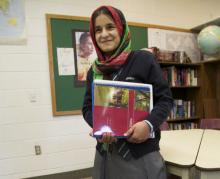
In the nearly 20 years I have been a working journalist, occasionally I have been tempted to intervene in the stories I have been assigned to cover. Most of the time, I have not, and that was probably the right choice. But once upon a time, about four years ago, I crossed the line. In a big way. I intervened because the life of another person was at stake and I knew that my calling was to be human, to react, to help, to do whatever I could to save a life. It's the best decision I've ever made. Hands down.
As I read a remarkable story in the Toronto Star newspaper, I wondered if the paper's veteran foreign correspondent, Paul Watson, now feels the same way.
Earlier this month, Watson, who is Canada's only Pulitzer Prize-winner, arrived in Toronto from Kandahar, Afghanistan with a very special package: a 17-year-old Afghan girl forced to flee her homeland, in the reporter's care, to escape certain death at the hands of Taliban assassins.
Most real-life law students I've met are at way, way less risk of being murdered than their counterparts in a John Grisham novel--except for Francia Marquez. The Afro-Colombian activist and mother of two has received multiple death threats as she advocates to keep her home community from having their ancestral home stolen by a land-grab big mining project.
There's gold in them thar hills in Francia's home, La Toma, in Colombia's Cauca province. Families in her hometown have lived for generations off of small-scale, by-hand gold mining. (Francia herself still puts in some mine time when she visits home, although these days she's spending the most time in her legal studies in Bogota.)
But lots of larger-scale mining concerns want in on the action. Some have sent in bulldozers illegally. Others are joining the land rush of getting mining concessions from the national government--notwithstanding laws on the books that give local communities various rights, including prior consultation on any mining projects.

We're once again in that sugary time of year, Girl Scout cookie season — but, as two Girl Scouts from Ann Arbor, Mich., want you to know, there's palm oil in those cookies, as there is in many foods we eat. And palm oil has been linked not only with rainforest destruction in Indonesia, but with plantations in league with paramilitary killers in Colombia. (Kind of gives appalling new meaning to the phrase “cookie monster.”)
Last year I also met with Colombian farmers driven off their land by paramilitaries, as I write about in this month's issue of Sojourners, so I was excited to interview Madison and Rhiannon after their recent trip to Colombia.
Read on to find out about how, trying to live by the Girl Scout Law, these two intrepid 11th-graders have been on a five-year mission to stop cookies — and lots of other things you may be planning to eat — from, well, palming off human rights abuses on U.S. snack-seekers.

It’s hard to remember the warm-up to the Iraq war now almost 10 years old. Following the devastating experience of 9/11 (Sept. 11, 2001), the United States experienced enormous national feelings of anger and sought a means to identify and punish those who were guilty of this horrendous act of terror. We now know that within days, the White House (in particular, the vice president’s office) was pointing a finger at Iraq and within 12 months, any observer could tell that we were on our way to war.
On March 19, 2003, when the invasion began I remember telling a class of students that they ought to remember this day well. It might be a war the U.S. would regret and it might lead to an involvement in the Middle East we don’t know how to end. Now ten years later we’re still mired over there.
What were the reasons for the war? Let’s make a list:
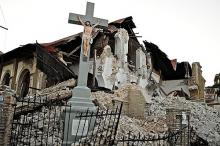
How does one dig out from under such tragedy? How does one have hope for a better life, for a new Haiti?
In a meditation titled "The Gates of Hope," Minister Victoria Safford writes:
"Our mission is to plant ourselves at the gates of hope -- not the prudent gates of Optimism, which are somewhat narrower; nor the stalwart, boring gates of Common Sense; nor the strident gates of self-righteousness ... nor the cheerful, flimsy garden gate of 'Everything is gonna be all right,' but a very different, sometimes very lonely place, the place of truth-telling, about your own soul first of all and its condition, the place of resistance and defiance, the piece of ground from which you see the world both as it is and as it could be, as it might be, as it will be; the place from which you glimpse not only struggle, but joy in the struggle — and we stand there, beckoning and calling, telling people what we are seeing, asking people what they see."
Indeed, we need to plant ourselves at the gates of hope and work toward a just peace, on Earth as it is in heaven.

A lot changes in 50 years.
In 1962, people didn’t have the internet, a cell phone, a microwave oven and many probably didn’t yet have a color television set. JFK was president and no one had been to the moon yet. Steve Jobs hadn’t even invented anything yet – he was only 7 years old.
But one thing that remains is USAID. 2012 marks the agency’s 50th anniversary, and its commitment to global political, economic and social development has been sustained since its foundation in 1961.

I love seeing who is chosen as TIME Magazine’s Person of the Year.
But sometimes TIME's honoree is not just a “Person.” Sometimes it’s “Persons” or even a thing.
Sometimes it’s the biggest news story of the year. Sometimes it encapsulates the zeitgeist, global urgings, or our collective mood.
This time around, it’s all of those things: A person, a group, a zeitgeist, a news story.
According to TIME, 2011 is the year of “The Protester.”

Earlier this month, Sojourners board member and former General Secretary of the Reformed Church in America, Wes Granberg-Michaelson, journeyed to Cuba with a delegation of religious leaders from the National Council of Churches.
Their visit culminated in a joint declaration celebrating signs of unity between the U.S. and Cuban churches. Sixteen representatives of U.S. National Council of Churches member communions were in Cuba November 28 through December 2 meeting with Cuban church and political leaders, including President Raúl Castro.
The delegation, which Cuban church leaders said was the highest ranking U.S. church group to visit the island in their memory, was led by the Rev. Dr. Michael Kinnamon, NCC general secretary. The joint statement by the churches declared that normalization of relations between the U.S. and Cuba would be in the best interest of both nations, and the leaders called for the resolution of three humanitarian issues “which cause unjustifiable human misunderstanding and suffering.” Foremost among the issues is the 53-year-old U.S. economic embargo of Cuba that dates back to the administration of President John F. Kennedy.
Read a series of dispatches from Granberg-Michaelson inside God's Politics.
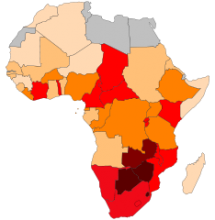
The news is hopeful. We have seen both progress and proof:
- New data shows that an HIV-positive person on treatment is 96 percent less likely to pass HIV on to others.
- It only costs, on average, $335 for AIDS treatment through PEPFAR (down nearly 70 percent since 2004!).
- 22 countries in sub-Saharan Africa have reduced new HIV infections by 25 percent.
- Clinical trials show that voluntary male circumcision reduces the risk of new HIV infection in men by roughly 60 percent.
Yesterday was truly a momentous occasion. Looking at all the progress we have made, especially in the last 10 years, it is a moment for us to not only celebrate, but in the words of President Jakaya Kikwete of Tanzania, “recommit ourselves,” to end the fight against AIDS totally.

Today marks the anniversary of World AIDS Day. The USAID estimates that since the epidemic began, over 60 million people have been infected with the disease, and over 25 million lives taken.
One of the most prominant figures fronting the fight against AIDS is U2 frontman, Bono. In 2002, Bono became vocal about the epidemic, embarking on a tour across the American Midwest to recruit churches to join the fight against AIDS in Africa. In Christianity Today’s 2003 feature “Bono’s American Prayer,” (written by Sojo’s own Cathleen Falsani) he articulates the crucial role the church must play in combating the epidemic.
"If the church doesn't respond to this, the church will be made irrelevant. It will look like the way you heard stories about people watching Jews being put on the trains. We will be that generation that watched our African brothers and sisters being put on trains."
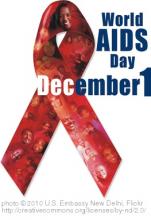
By 2015, we could have an AIDS free generation.
AIDS was first identified nearly 30 years ago and has claimed countless lives. Currently, 1,000 babies around the globe are born with the virus each day. During much of the past few decades it’s been hard to see much hope when it comes to turning the tide against this disease.
But, thanks to smart public health decisions, public investment in strategies that work, and innovative implementation by NGO’s, we can now begin to envision a day when this mountain will be moved. During FY 2011 PEPFAR, (The President’s Emergency Plan for AIDs Relief) supported the prevention of 200,000 children contracting HIV/AIDS from their mother.
With continued investment we are just a few years away from preventing nearly ALL children from being born with the virus.
The U.S. should put publicly funded medicines in reach of the world's poor.
If we look at what is happening this week – elections in Egypt and the Democratic Republic of Congo, an aid effectiveness conference in South Korea, the continuing Arab Spring in Syria and beyond, World Aids Day Thursday – and in the coming weeks -- the U.N. climate change conference, COP17 -- we cannot pretend that these events have no impact on our lives here and now.
Every one of these events is a matter of justice. The citizens of Egypt and the Democratic Republic of Congo deserve the opportunity to express freely, without fear of intimidation or violence, how they believe their country should be governed. Having spent some time in the region, I believe that the people of the DRC deserve more than any other to live in a country where they are safe and secure.
How we assist other countries in their development is an issue of justice.

The huge throng filled the entire Square and was reminiscent of the historic mass mobilizations in February that brought down the Mubarak dictatorship. The rally was announced as a ‘million man march’ and was backed of a broad cross section of Egyptian activist groups, from liberal secularists to conservative Islamists. The Muslim Brotherhood did not support the march, although many of its youth members joined the crowd. The rally had a positive and hopeful spirit, in sharp contrast to the earlier violent clashes, which we witnessed on November 20.
The atmosphere in the Square on Friday was almost festive. We saw families with children, vendors selling food and drinks, face-painting on children (and thanks to a group of laughing teenagers, painted hands) and everywhere we saw the red, white, and black stripes of the Egyptian flag. It was a diverse crowd, young and old, women and men, middle class and the very poor. We were welcomed and greeted warmly by many.
The crowd was friendly but determined in its commitment to fulfill the promise of the revolution. There were no speeches, but constant chanting rose from groups throughout the Square, all with a similar message: Military rule must end.
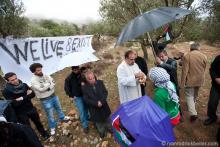
What one quickly learns when visiting Bethlehem is that the political climate today is quite similar to the one that was prevailing during the time of Jesus. One exception is that the Palestinian inhabitants of Bethlehem today are being occupied by those who consider themselves the offspring or cultural descendants of Jews who were under the yoke of Roman occupation in the first century. Other reminders of the political similarities are the weekly demonstrations on the outskirts of Bethlehem by Palestinians, Israelis, and internationals to nonviolently protest the confiscation of Palestinian land to build new Jewish settlements. Unarmed and nonviolent demonstrators face heavily equipped Israeli troops who protect those who steal Palestinian lands in the West Bank and construct segregated settlements on them. This reminds us of the brutality of the Roman occupation forces against Jewish freedom fighters.
But Bethlehem today is not all consumed with politics. Many of the folks in Bethlehem could not care less about politics. Repeated disappointments with the host of so-called peace brokers and failed peace plans have caused many Bethlehemites to abandon politics. They just want a decent standard of living to carry on with life in security with their children and grandchildren. These are the people who in spite of the same closures and repression by the forces of occupation, choose to be peaceful. They hope that freedom will come but they don't know when or how it will come. Like the folks who lived when Jesus was born, they continue to wait quietly for political liberation.